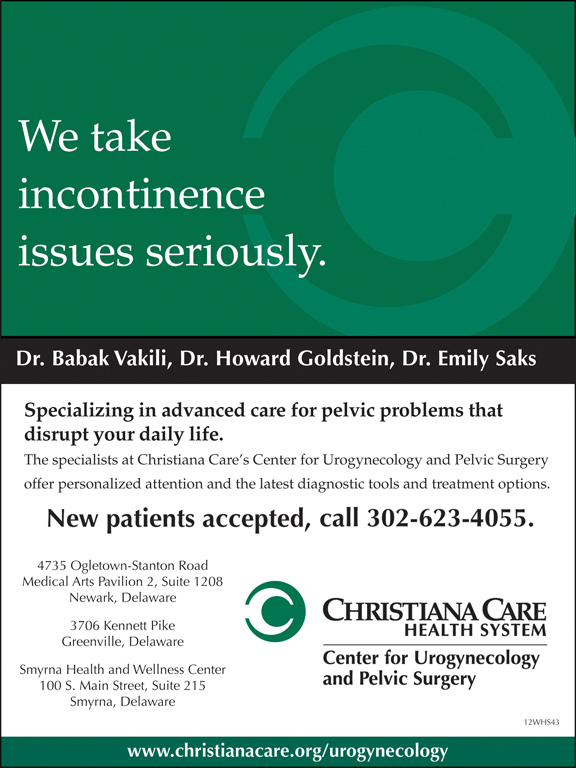Get back to an active life, without surgery Our urogynecologists can help

By Howard B. Goldstein, D.O., MPH
Howard B. Goldstein, D.O., MPH, is a fellow of the American College of Obstetrics and Gynecology. Hecompleted a fellowship in Female Pelvic Medicine and Reconstructive Surgery at Cooper University Hospital in Camden, NJ. He currently serves as the Director of Research and Education for the Division of Urogynecology.
Many women suffer in silence with a leaky bladder because they believe nothing can be done to help them, short of major surgery.
The truth is there are procedures that can provide relief without surgery. So, don’t hesitate to seek help from an urogynecologist, a doctor who is specially trained in both urology and gynecology.
Often, women experience leaking when the muscles that support the bladder, the rectum and the uterus are stretched or damaged. When that happens, the muscles cannot properly support the organs and they begin to fall out of place and drop into the vagina. This condition is known as pelvic prolapse.
Prolapse can occur at any age. Most often, the muscles are weakened by childbirth and the pressure it creates, especially if the baby is big or labor is long or difficult.
Women who have had Caesarean sections or have never given birth can have prolapse, as well. Other risk factors include menopause, smoking, a family history of prolapse, and obesity (defined as weighing 20 percent or more above your target weight). The risk also is greater for women who have had pelvic surgery, including a hysterectomy.
Prolapse is not life threatening. But it has a dramatic impact on a woman’s quality of life because it usually results in urinary incontinence, making her leak urine when she sneezes, laughs or exercises.
A simple device that has been around for many years, called a pessary, can change your life for the better. Here is what we hear patients say:
“Now that I don’t worry about leaking, I can go out with my friends.”
“I am exercising — and losing weight!”
“I didn’t realize how much better I would feel.”
Relief without surgery through structural support
Safe, simple and effective. A pessary is inserted into the vagina to provide structural support. Most pessaries are made from non-allergenic silicon and come in many shapes and sizes.
Your urogynecologist is trained to make certain you get a perfect fit that provides the best solution for your particular issue.
Women can benefit from the use of a pessary in many ways. Some women insert the pessary before they go to the gym or head out for a jog, then remove it after their workout. Others wear a pessary only during the day. Another option is using the pessary for several days, and then removing it for cleaning.
That said, not all women feel comfortable taking care of a pessary. Not to worry. There are a number of pessaries that can be used for two or three months at a time and maintained during regular visits to the doctor’s office.
Exercises to strengthen muscles and stop the leaking.
Women also can strengthen the muscles that have been stretched through a series of exercises. You might have heard of Kegel exercises, in which women repeatedly contract and relax those muscles.
The problem is that many women do not perform the exercises correctly. That can actually cause more urine leakage. By working with a physical therapist specially trained in women’s health, you can learn the proper way to exercise and strengthen the muscles.
The first step to learning if there is a non-surgical solution for you is a conversation with your doctor, who will examine you and discuss various options for treatment. Together, we can come up with a plan to get you back to an active life.
To make an appointment with Howard Goldstein, D.O., of the Christiana Center for Urogynecology and Pelvic Surgery, contact one of our three locations:
Christiana Hospital
Medical Arts Pavilion 2
4735 Ogletown-Stanton Road, Suite 1208, Newark
302-623-4055
Christiana Care Center for Women’s Health
3706 Kennett Pike, Greenville
Smyrna Health & Wellness Center
100 S. Main Street, Suite 215
Smyrna
call 302-623-4055 or visit www.christianacare.org/urogynecology.
Emily K. Saks, M.D., MSCE, is a urogynecologist with the Christiana Care Center for Urogynecology and Pelvic Surgery. Dr. Saks completed a residency in Obstetrics and Gynecology at Pennsylvania Hospital in Philadelphia and has completed a fellowship in Female Pelvic Medicine and Reconstructive Surgery at the Hospital of the University of Pennsylvania.

Babak Vakili, M.D., is the director of the Center for Urogynecology and Pelvic Surgery. Dr. Vakili is a fellow of the American College of Obstetrics and Gynecology. He completed a fellowship in Female Pelvic Medicine and Reconstructive Surgery at the Louisiana State University Health Science Center in New Orleans, LA.



